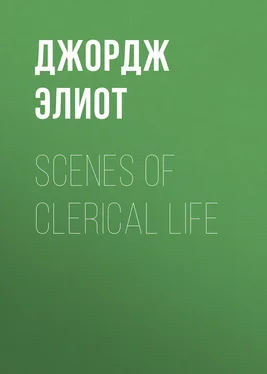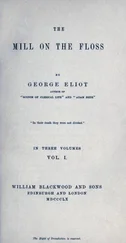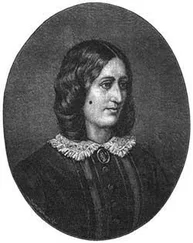Джордж Элиот - Scenes of Clerical Life
Здесь есть возможность читать онлайн «Джордж Элиот - Scenes of Clerical Life» — ознакомительный отрывок электронной книги совершенно бесплатно, а после прочтения отрывка купить полную версию. В некоторых случаях можно слушать аудио, скачать через торрент в формате fb2 и присутствует краткое содержание. Жанр: foreign_antique, Религиозная литература, foreign_religion, на английском языке. Описание произведения, (предисловие) а так же отзывы посетителей доступны на портале библиотеки ЛибКат.
- Название:Scenes of Clerical Life
- Автор:
- Жанр:
- Год:неизвестен
- ISBN:нет данных
- Рейтинг книги:5 / 5. Голосов: 1
-
Избранное:Добавить в избранное
- Отзывы:
-
Ваша оценка:
- 100
- 1
- 2
- 3
- 4
- 5
Scenes of Clerical Life: краткое содержание, описание и аннотация
Предлагаем к чтению аннотацию, описание, краткое содержание или предисловие (зависит от того, что написал сам автор книги «Scenes of Clerical Life»). Если вы не нашли необходимую информацию о книге — напишите в комментариях, мы постараемся отыскать её.
Scenes of Clerical Life — читать онлайн ознакомительный отрывок
Ниже представлен текст книги, разбитый по страницам. Система сохранения места последней прочитанной страницы, позволяет с удобством читать онлайн бесплатно книгу «Scenes of Clerical Life», без необходимости каждый раз заново искать на чём Вы остановились. Поставьте закладку, и сможете в любой момент перейти на страницу, на которой закончили чтение.
Интервал:
Закладка:
'I think I must ask Hackit to lend me twenty pounds, for it is nearly two months till Lady-day, and we can't give Woods our last shilling.'
'I hardly like you to ask Mr. Hackit, dear—he and Mrs. Hackit have been so very kind to us; they have sent us so many things lately.'
'Then I must ask Oldinport. I'm going to write to him tomorrow morning, for to tell him the arrangement I've been thinking of about having service in the workhouse while the church is being enlarged. If he agrees to attend service there once or twice, the other people will come. Net the large fish, and you're sure to have the small fry.'
'I wish we could do without borrowing money, and yet I don't see how we can. Poor Fred must have some new shoes; I couldn't let him go to Mrs. Bond's yesterday because his toes were peeping out, dear child! and I can't let him walk anywhere except in the garden. He must have a pair before Sunday. Really, boots and shoes are the greatest trouble of my life. Everything else one can turn and turn about, and make old look like new; but there's no coaxing boots and shoes to look better than they are.'
Mrs. Barton was playfully undervaluing her skill in metamorphosing boots and shoes. She had at that moment on her feet a pair of slippers which had long ago lived through the prunella phase of their existence, and were now running a respectable career as black silk slippers, having been neatly covered with that material by Mrs. Barton's own neat fingers. Wonderful fingers those! they were never empty; for if she went to spend a few hours with a friendly parishioner, out came her thimble and a piece of calico or muslin, which, before she left, had become a mysterious little garment with all sorts of hemmed ins and outs. She was even trying to persuade her husband to leave off tight pantaloons, because if he would wear the ordinary gun-cases, she knew she could make them so well that no one would suspect the sex of the tailor.
But by this time Mr. Barton has finished his pipe, the candle begins to burn low, and Mrs. Barton goes to see if Nanny has succeeded in lulling Walter to sleep. Nanny is that moment putting him in the little cot by his mother's bedside; the head, with its thin wavelets of brown hair, indents the little pillow; and a tiny, waxen, dimpled fist hides the rosy lips, for baby is given to the infantile peccadillo of thumb-sucking. So Nanny could now join in the short evening prayer, and all could go to bed. Mrs. Barton carried up-stairs the remainder of her heap of stockings, and laid them on a table close to her bedside, where also she placed a warm shawl, removing her candle, before she put it out, to a tin socket fixed at the head of her bed. Her body was very weary, but her heart was not heavy, in spite of Mr. Woods the butcher, and the transitory nature of shoe-leather; for her heart so overflowed with love, she felt sure she was near a fountain of love that would care for husband and babes better than she could foresee; so she was soon asleep. But about half-past five o'clock in the morning, if there were any angels watching round her bed—and angels might be glad of such an office they saw Mrs. Barton rise up quietly, careful not to disturb the slumbering Amos, who was snoring the snore of the just, light her candle, prop herself upright with the pillows, throw the warm shawl round her shoulders, and renew her attack on the heap of undarned stockings. She darned away until she heard Nanny stirring, and then drowsiness came with the dawn; the candle was put out, and she sank into a doze. But at nine o'clock she was at the breakfast-table, busy cutting bread-and-butter for five hungry mouths, while Nanny, baby on one arm, in rosy cheeks, fat neck, and night-gown, brought in a jug of hot milk-and-water. Nearest her mother sits the nine-year-old Patty, the eldest child, whose sweet fair face is already rather grave sometimes, and who always wants to run up-stairs to save mamma's legs, which get so tired of an evening. Then there are four other blond heads—two boys and two girls, gradually decreasing in size down to Chubby, who is making a round O of her mouth to receive a bit of papa's 'baton'. Papa's attention was divided between petting Chubby, rebuking the noisy Fred, which he did with a somewhat excessive sharpness, and eating his own breakfast. He had not yet looked at Mamma, and did not know that her cheek was paler than usual. But Patty whispered, 'Mamma, have you the headache?'
Happily coal was cheap in the neighbourhood of Shepperton, and Mr. Hackit would any time let his horses draw a load for 'the parson' without charge; so there was a blazing fire in the sitting-room, and not without need, for the vicarage garden, as they looked out on it from the bow-window, was hard with black frost, and the sky had the white woolly look that portends snow.
Breakfast over, Mr. Barton mounted to his study, and occupied himself in the first place with his letter to Mr. Oldinport. It was very much the same sort of letter as most clergymen would have written under the same circumstances, except that instead of perambulate, the Rev. Amos wrote preambulate, and instead of 'if haply', 'if happily', the contingency indicated being the reverse of happy. Mr. Barton had not the gift of perfect accuracy in English orthography and syntax, which was unfortunate, as he was known not to be a Hebrew scholar, and not in the least suspected of being an accomplished Grecian. These lapses, in a man who had gone through the Eleusinian mysteries of a university education, surprised the young ladies of his parish extremely; especially the Misses Farquhar, whom he had once addressed in a letter as Dear Mads., apparently an abbreviation for Madams. The persons least surprised at the Rev. Amos's deficiencies were his clerical brethren, who had gone through the mysteries themselves.
At eleven o'clock, Mr. Barton walked forth in cape and boa, with the sleet driving in his face, to read prayers at the workhouse, euphemistically called the 'College'. The College was a huge square stone building, standing on the best apology for an elevation of ground that could be seen for about ten miles around Shepperton. A flat ugly district this; depressing enough to look at even on the brightest days. The roads are black with coal-dust, the brick houses dingy with smoke; and at that time—the time of handloom weavers—every other cottage had a loom at its window, where you might see a pale, sickly-looking man or woman pressing a narrow chest against a board, and doing a sort of treadmill work with legs and arms. A troublesome district for a clergyman; at least to one who, like Amos Barton, understood the 'cure of souls' in something more than an official sense; for over and above the rustic stupidity furnished by the farm-labourers, the miners brought obstreperous animalism, and the weavers in an acrid Radicalism and Dissent. Indeed, Mrs. Hackit often observed that the colliers, who many of them earned better wages than Mr. Barton, 'passed their time in doing nothing but swilling ale and smoking, like the beasts that perish' (speaking, we may presume, in a remotely analogical sense); and in some of the alehouse corners the drink was flavoured by a dingy kind of infidelity, something like rinsings of Tom Paine in ditch-water. A certain amount of religious excitement created by the popular preaching of Mr. Parry, Amos's predecessor, had nearly died out, and the religious life of Shepperton was falling back towards low-water mark. Here, you perceive, was a terrible stronghold of Satan; and you may well pity the Rev. Amos Barton, who had to stand single-handed and summon it to surrender. We read, indeed, that the walls of Jericho fell down before the sound of trumpets; but we nowhere hear that those trumpets were hoarse and feeble. Doubtless they were trumpets that gave forth clear ringing tones, and sent a mighty vibration through brick and mortar. But the oratory of the Rev. Amos resembled rather a Belgian railway-horn, which shows praiseworthy intentions inadequately fulfilled. He often missed the right note both in public and private exhortation, and got a little angry in consequence. For though Amos thought himself strong, he did not feel himself strong. Nature had given him the opinion, but not the sensation. Without that opinion he would probably never have worn cambric bands, but would have been an excellent cabinetmaker and deacon of an Independent church, as his father was before him (he was not a shoemaker, as Mr. Pilgrim had reported). He might then have sniffed long and loud in the corner of his pew in Gun Street Chapel; he might have indulged in halting rhetoric at prayer-meetings, and have spoken faulty English in private life; and these little infirmities would not have prevented him, honest faithful man that he was, from being a shining light in the dissenting circle of Bridgeport. A tallow dip, of the long-eight description, is an excellent thing in the kitchen candlestick, and Betty's nose and eye are not sensitive to the difference between it and the finest wax; it is only when you stick it in the silver candlestick, and introduce it into the drawing-room, that it seems plebeian, dim, and ineffectual. Alas for the worthy man who, like that candle, gets himself into the wrong place! It is only the very largest souls who will be able to appreciate and pity him—who will discern and love sincerity of purpose amid all the bungling feebleness of achievement.
Читать дальшеИнтервал:
Закладка:
Похожие книги на «Scenes of Clerical Life»
Представляем Вашему вниманию похожие книги на «Scenes of Clerical Life» списком для выбора. Мы отобрали схожую по названию и смыслу литературу в надежде предоставить читателям больше вариантов отыскать новые, интересные, ещё непрочитанные произведения.
Обсуждение, отзывы о книге «Scenes of Clerical Life» и просто собственные мнения читателей. Оставьте ваши комментарии, напишите, что Вы думаете о произведении, его смысле или главных героях. Укажите что конкретно понравилось, а что нет, и почему Вы так считаете.










